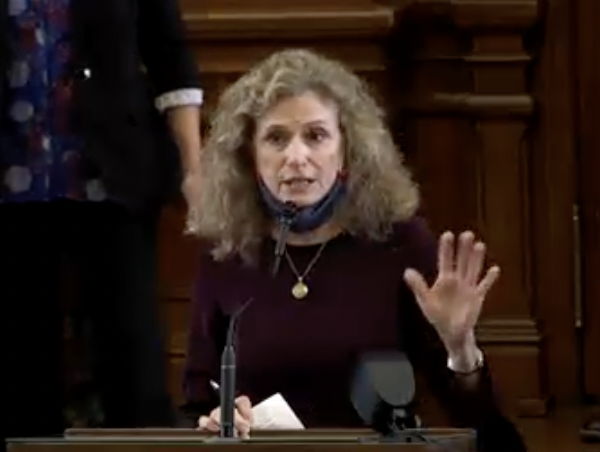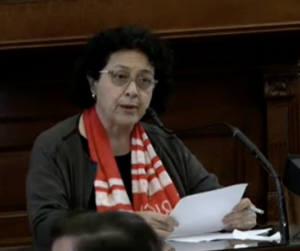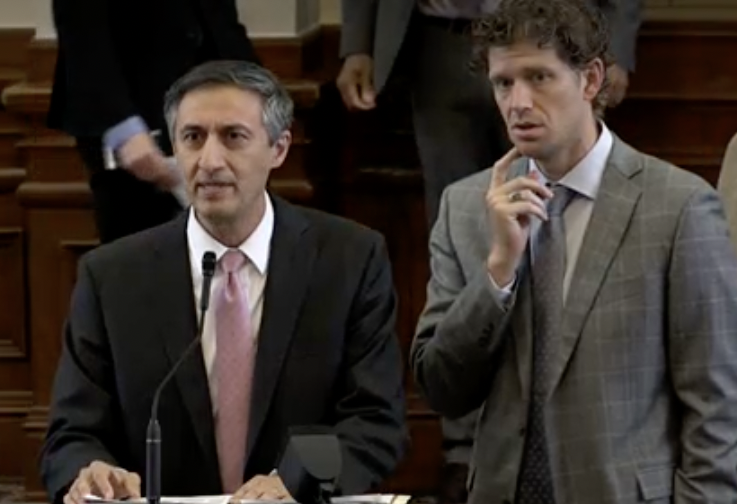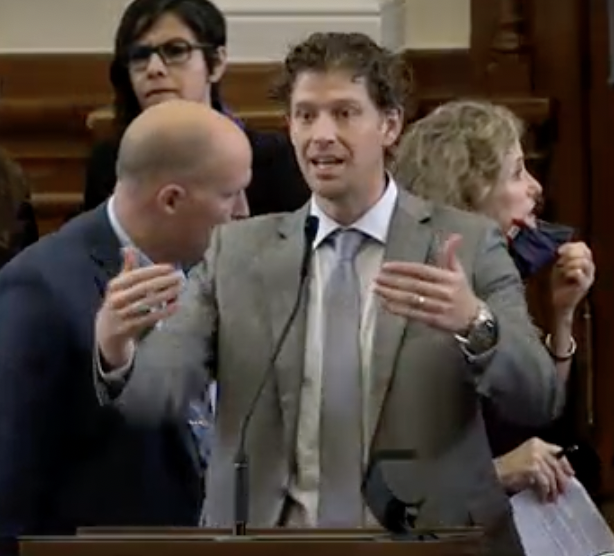Mayoral candidate said funding for victims was a “feel good” measure
A political action committee backing mayoral candidate Kirk Watson, Stand Together Austin, has sent text messages to voters accusing Celia Israel of blocking funding for crime victims in the 2021 legislative session.
One such text stated, “Hello, this is Alex from Stand Together Austin. Celia Israel stopped a bill that would have provided funding to victims of domestic violence in 2021. Celia may have felt comfortable taking money away from those who need it, but we know we should never turn our backs to the victims of violent crime.”
“Can we count on you to Stand Together Austin and vote for Kirk Watson, who will stand up for victims of domestic violence?”
Though Israel dismissed the text messages as “deceitful,” a review of the legislative record shows that the ads are truthful—though not the whole truth.
Toward the end of the 2021 legislative session, Israel single-handedly killed a bipartisan bill relating to the Crime Victims’ Compensation Program, using a procedural move shortly before a key session deadline, according to the House Journal for May 11, 2021.
The bill would have raised an estimated $29.5 million in revenue for victim-related services and sexual assault programs in the 2022-23 biennium, according to a fiscal note by the Legislative Budget Board.
Israel did so because she objected to the source of the revenue, while insisting that her actions wouldn’t negatively impact crime victims. “This is not defunding the crime victims’ fund,” she said on the House floor.
Despite the bad optics of killing a bill for sexual assault survivors, she said, “I feel comfortable in what I’m doing right now.” Hence why the text messages from the PAC stated that Israel “felt comfortable” taking money away from survivors.
Her maneuver, though controversial, didn’t end up doing lasting damage to the program because the legislature found an alternative source of funds.
Bipartisan bill
The bill in question was House Bill 4471 by Craig Goldman (R-Fort Worth), which would have increased funding for the state’s Crime Victims’ Compensation Program. The fund covers victims’ medical care, loss of earnings, funeral services, mental health care appointments, child care, attorney fees, and relocation costs for victims of family violence, sexual assault, stalking or human trafficking.
Sixty-five percent of applicants to the victims’ fund in FY 2021 were female. Half of all victims who applied had suffered assaults or aggravated assaults. The next most common crimes were sexual abuse of a child (11 percent), sexual assault (8.8 percent), and homicide (7.9 percent), according to the program’s annual report.
Established in 1979, the fund had long relied on court fees, federal matching funds, $8 monthly fees paid by parolees, and court-ordered restitution paid by perpetrators—not tax dollars. Because of the Covid-19 pandemic, which caused a drop-off in judicial activity, the fund faced a projected shortfall of $70 million. Additionally, the state’s Sexual Assault Program Fund—which was also eligible for increased funding under Goldman’s bill—had lost money because it relied partly on a tax on strip clubs, which didn’t fare well during the pandemic.

Lawmakers fished around for other sources of revenue to make up for the shortfall. The solution in Goldman’s HB 4471 was to increase an intergovernmental fee already collected by the Office of the Attorney General (OAG), the state agency administering the victim fund. The OAG collects a “fee for examination” every time a governmental entity issues bonds or certificates of obligation. The fees range from a minimum of $750 up to a maximum of $9,500 depending on the amount to be borrowed. Goldman proposed to raise that to $50,000.
The increase would have meant higher costs for political subdivisions, state agencies, community colleges, and public corporations. It was an odd and roundabout solution to a funding shortfall in an unrelated program. But it wasn’t controversial—at least not initially.
There were no witnesses against the bill at a public hearing April 16, 2021. The bill passed unanimously out of committee five days later, including four Democratic votes. And Representative Donna Howard (D-Austin), Israel’s deskmate, signed on as a co-author.
House leaders then placed the bill on the Local and Consent Calendar, a mechanism for expedited approval of bipartisan bills. Generally, only bills that are expected to be truly noncontroversial are placed on that calendar, because every House member has the privilege of killing such a bill by contesting it in debate for ten minutes.
HB 4471 ‘would have negatively impacted higher education’
Even though nobody had publicly objected to HB 4471, somebody did so privately to Israel. When the bill came up for a vote May 11th, Israel announced her intention to kill the bill by speaking on it for ten minutes, explaining vaguely that she had been approached by “some folks” who had concerns about the bill.

“I talked to some of the folks involved with (i.e., affected by) this bill, and it’s got some troubling language,” Israel said. She then proceeded to read through the text of the bill slowly and deliberately—a time-wasting tactic—without elaborating further on her reasons for opposing the bill.
She was interrupted by two GOP lawmakers who pleaded with her to drop her contestation, but Israel persisted.
Howard, whom Israel had consulted prior to this maneuver, also spoke briefly toward the end of the 10-minute period. She referred vaguely to “stakeholders” who opposed the bill. Though Howard had signed on as a co-author of the bill just weeks before, she said she had done so under the mistaken impression that the new revenue would come from fees on “financial institutions,” not public institutions such as “homeless (services) and hospitals and higher education.”

After about ten minutes, the speaker pro tempore declared the bill “contested.” That knocked the bill back to the calendars committee. Because the House was coming up against end-of-session deadlines for consideration of new bills, Israel’s maneuver meant the bill couldn’t be reconsidered on the regular calendar.
Minutes later, a lobbyist for a network of community colleges in San Antonio, Priscilla Camacho, tweeted her appreciation to Israel and Howard: “Thank you @CeliaIsrael & @DonnaHowardTX for ALWAYS fighting 4 survivors of sexual assault!”
Camacho, the Alamo Colleges District’s director of governmental affairs, added, “HB 4471 would not have been reliable funding 4 programs to help survivors & would have negatively impacted IHEs (institutions of higher education) & other public entities hit hard during COVID.” Both Howard and Israel retweeted that statement.
‘Feel good bill’
The two Republican lawmakers who interrupted Israel portrayed the matter quite differently. Representative Giovanni Capriglione (R-Southlake), who had played a role drafting the bill during the interim, said he was “shocked” by Israel’s objection. The crime fund “was running a deficit in terms of its ability to provide help, to women primarily, who were victims of sexual assault. And so we needed to find a way to make sure that those services continued,” he said.

Visibly exasperated, he asked Israel, “So I guess I’m trying to understand why you’re trying to not allow us to fund those much-needed, critical services.”
As she began a response, Israel referred to the bill as a “feel good” measure. Capriglione immediately jumped on this, saying, “I’m sorry, this isn’t a ‘feel-good’ deal. This is help and support for women who have been sexually assaulted. This isn’t a ‘feel-good.’ This is money that goes to nonprofits. I’m just sitting here shocked, and I mean that.”
“I mean, I get it—kind of—but on this bill…we did everything we could, and we wanted to continue to do everything we could, to help these victims.”

Similarly, Representative Matt Krause (R-Fort Worth), who had worked with Howard and Ann Johnson (D-Houston) on another bill to help sexual assault survivors, pleaded with Israel to withdraw her objection. “These are, as Representative Capriglione said, some women in some very tough circumstances and who find themselves in tough places. If you kill this bill, then we won’t be able to give them the help that they need.”
“In fact, I’ve been working with Representative Ann Johnson and I’ve worked with Representative Donna Howard on adding relocation services (in a separate bill) for some sexual assault survivors. And so if we don’t have this bill, we can’t increase the program to help out those women…I would implore you to withdraw (your objection) so we can pass this bill to help out survivors of domestic abuse.”
‘Political spite’ or substantive objection?
Israel’s maneuver also drew fire from Amanda Robertson, chief of staff of bill author Goldman, who tweeted that “no real feminist” would have blocked a measure to establish “reliable funding” for sexual assault survivors. Earlier on the same day, Israel had killed another bill authored by Goldman, which would have tweaked a commissioning requirement for airport police officers.
Watson has raised the possibility that Israel’s motive in killing HB 4471 was at least partly personal. In a recent email to Jack Craver, author of the Austin Politics newsletter, he wrote that that she killed the bill “out of political spite.”
“This was legislation supported by Democrats and Republicans, was on the Local & Consent Calendar, and had been unanimously supported until my opponent chose to kill it. No one, including advocacy groups or stakeholders, signed up in opposition to the bill during the committee hearing,” he stated.
However, Israel defended the move on substantive grounds in a series of tweets November 8th. “The bill in question was a Republican-led effort to strip dollars from nonprofits, public schools, and affordable housing under the guise of supporting survivors,” she wrote.
“The bill’s author was unwilling to work with advocates and other lawmakers to actually fix the problem at hand—simply creating a new problem, instead of truly supporting survivors and funding support programs outright, as opposed to being tied to other cuts. Supporting this bill would not have been in good faith,” Israel added.
“I’ve spoken publicly multiple times about my personal (childhood) experiences with domestic violence. So I take even greater offense that I’m now the target of last minute, deceitful campaign texts claiming I’ve turned my back on survivors,” she wrote.
Alternative funding
According to an investigative report by KXAN, the Crime Victim’s Compensation Program is dysfunctional. Payouts are delayed, staff turnover is high, and pay for administrators is too low to be competitive. Morale at the Office of the Attorney General is also low following a retaliation scandal involving Ken Paxton, who fired his top deputies in 2020 for making criminal allegations against him.
Even so, Israel’s maneuver doesn’t seem to have contributed to the problems, because the legislature came up with a different funding source. According to the OAG’s annual report on crime victim services, “the 87th Legislature acknowledged the COVID-19 revenue shortfall by appropriating over $101.5 million into CVCF (the crime victims’ fund) for the next two years. Of this amount, $54.8 million was appropriated in SB 8, 3rd called session from the Coronavirus State Fiscal Recovery Fund established under the American Rescue Plan.”
“The Legislature’s commitment to restoring solvency in CVCF is commendable and should allow for a healthy recovery” of the fund, assuming court operations and the economy continue to recover, the report stated.
State Senator Sarah Eckhardt (D-Austin) told KXAN that the amount of money in the fund was “healthy,” though, the staffing needed to disburse it was not.
Ineffective ‘smear campaign’?
Heading into the final weeks of the mayoral campaign, Israel has considerable momentum. She’s picked up lots of recent endorsements and boasted of a big fundraising haul. Final pre-election campaign finance reports are due by midnight Monday, December 5th.
It’s not obvious that Stand Together Austin’s attacks will hurt her that much. She’s brushed them off as a “smear campaign” and even sought to turn the attack to her advantage by spotlighting the donors behind the PAC, some of whom are Republicans.

Israel’s campaign emailed supporters November 16th saying, “We have called on Kirk Watson to denounce these underhanded tactics. But he has remained silent on this issue, and has given no indications on plans to change that… Why is my opponent staying silent? Look at who’s supporting him and this PAC.”
“Watson shares his biggest donors with Travis County GOP Chairman, Matt Mackowiak, one of the most divisive people in all of Austin politics. Many of those same Republicans are bankrolling the PAC spreading disinformation….”
The PAC’s treasurer is Jesus Garza, who was city manager when Watson was mayor. Its largest payments have been to Y-Strategy, a political consulting and advertising firm run by Mkyle Tomlinson, a veteran strategist for Democratic candidates.
Its top donors include oil magnate Bryan Shelffield, software entrepreneur Joe Liemandt; former Austin Chamber president Gary farmer; housing advocate Nicole Nosek; lawyer Carlos Zaffirini; and Kilroy Realty, owner of a downtown high rise.
Zaffirini and his mother, state senator Judith Zaffirini, have said they were surprised the PAC launched negative ads against Israel. “I do not condone it, nor would I have given to a PAC that attacked either candidate’s integrity. I consider both candidates friends and would strongly encourage both of them to focus on the needs of the City of Austin and to remain focused on their positive visions for this city,” he said.
Trust indicators: Bulldog reporter Daniel Van Oudenaren is a journalist with 13 years experience in local, state, and international reporting.
Related Bulldog coverage:
Mayoral race and three council contests will go to runoff, November 9, 2022
What kind of legislator was Celia Israel? October 28, 2022
What kind of major was Kirk Watson? October 24, 2022








Your reporting is always thoughtful and accurate and I appreciate the detail and time to fully explain the real story.
Call me a fan of good journalism!